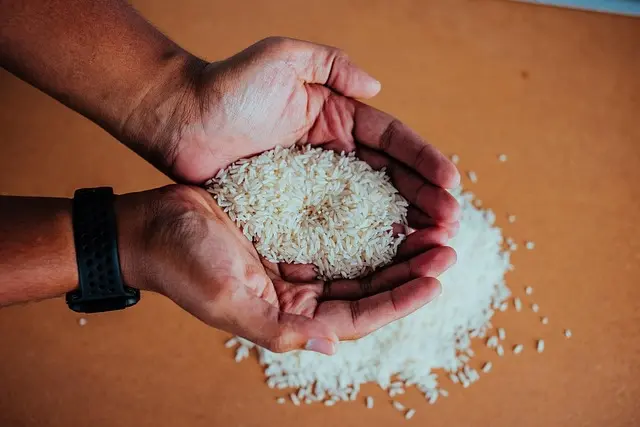Johdanto riisin tuontikiellolle
Filippiinit aloitti 1. syyskuuta 2025 60 päivän toimitsijakielto tavallisen ja hyvin hiotun riisin tuonnista. Tämän lokakuun 30. päivään asti voimassa olevan toimenpiteen tavoitteena on vakauttaa riisin kotimarkkinahintoja ja suojella paikallisia viljelijöitä tärkeän sadonkorjuukauden aikana.
Yksityiskohdat keskeytyksestä ja sen laajuudesta
Keskeytys vahvistettiin kautta Toimeenpanomääräys nro 93, jonka presidentti Ferdinand Marcos Jr. vahvisti 29. elokuuta 2025. Se kohdistuu erityisesti tavallisen riisin maahantuonnin väliaikaiseen keskeyttämiseen, kun taas lukuun ottamatta erikoisriisilajikkeita joita ei juurikaan viljellä filippiiniläisten maanviljelijöiden toimesta. Tämä valikoiva lähestymistapa varmistaa, että erikoisriisien markkinarako pysyy tarjonnan piirissä, kun taas suurempi osa paikallisesta riisitaloudesta on suojattu tuontikilpailulta sadonkorjuun huippuaikoina.
Politiikan tavoitteet
Tämän keskeytyksen perimmäisenä tarkoituksena on antaa kotimarkkinoiden täysin hyödyntää sadonkorjuukauden synnyttämä runsas paikallinen tarjonta. Tällä pyritään vakauttaa riisin hinnat ja mahdollistaa filippiiniläisille viljelijöille palayn (kuorimaton riisi) myynnin kohtuulliseen ja oikeudenmukaiseen hintaan, mikä turvaa heidän toimeentulonsa.
Virastokoordinointi ja -valvonta
EO N:o 93:n täytäntöönpanon sujuvoittamiseksi, Maatalousministeriö (DA) tekee yhteistyötä Tullihallitus ja Kauppa- ja teollisuusministeriö (KTM). Näillä virastoilla on vastuu tarvittavien ohjeiden laatimisesta, jotka koskevat täytäntöönpanoa, valvontaa ja osallistuvien instituutioiden koordinointia. On tärkeää, että ne kokoontuvat 30 päivän kuluessa määräyksen voimaantulosta arvioidakseen sen vaikutusta riisin tarjontaan ja hintaan.
Joustavuutta määräaikaisten jäähyjen pituuksissa
Vaikka toiminta on tällä hetkellä keskeytetty 60 päiväksi, politiikkaan sisältyy joustavuutta. Jaksoa voidaan lyhentää tai pidentää markkinaolosuhteiden mukaan sekä DA:n, talous-, suunnittelu- ja kehitysosaston ja DTI:n yhteisestä suosituksesta. Tämä mukautuva hallintotapa mahdollistaa hallituksen nopean reagoinnin odottamattomiin haasteisiin tai markkinoiden epätasapainoon.
Markkinoiden Perusvaikutukset
Tämän keskeytyksen taustalla on Filippiinien vahva riisintuotanto vuoden 2025 alkupuolella sekä ennätyksellinen riisin tuonnin kasvu edeltävinä kuukausina. Tuonnin lisääntyminen johtui osittain alennetuista tullitariffeista, mikä johti paikallisten riisinhintojen jyrkkä lasku. Tämä yhdistelmä aiheutti haasteita paikallisille tuottajille, erityisesti sadon myymisessä kannattavilla tasoilla.
Riisin tullitariffin vaikutus
Tämä väliaikainen tuontikielto perustuu seuraavan tahon myöntämään valtuutukseen: Rice Tariffication Law, joka valtuuttaa hallitusvallan asettamaan rajallisia tuontirajoituksia kotimaan markkinoiden vakauttamiseksi tietyissä olosuhteissa. Se on käytännöllinen työkalu, jonka tavoitteena on varmistaa elintarviketurva ja tasapainottaa samalla paikallisten viljelijöiden ja kuluttajien etuja.
Vaikutukset logistiikka- ja toimitusketjutoimintoihin
Vaikka pääasiassa maatalouspolitiikka, keskeytyksellä on kauaskantoisia vaikutuksia logistiikkaan ja toimitusketjun hallintaan maassa ja sen ulkopuolella. Koska riisi on peruselintarvike, sen tuontikiellolla on vaikutusta kuljetusaikatauluihin, tulliselvitykseen, rahtikapasiteettiin ja varastologistiikkaan.
Logistiikkapalveluiden tarjoajat — mukaan lukien huolintapalvelut ja rahdinkuljetusyritykset — saattavat havaita muutoksia kysyntämalleissa, erityisesti riisin ja siihen liittyvien lähetysten irtolastikuljetuksissa. Kansainvälisiä riisilähetyksiä yleensä hoitavat transitovirrat saattavat siirtyä paikalliseen jakeluun vastatakseen kotimaan käsittelyn kasvuun.
Lisäksi tuontikiellon aikana on mahdollisuus hioa toimitusketjustrategioita. Riisin tuonnista riippuvaisten yritysten on ehkä mukautettava varasto- ja toimitussuunnitteluaan, kun taas GetTransport.comin kaltaiset rahdinkuljetusalustat toimivat kätevinä keskuksina erilaisten rahtitarpeiden hallinnassa, niin koti- ja toimistomuuttojen kuin suurikokoisten tavaroiden ja ajoneuvojen lähettämisessäkin, tarjoten erinomaista joustavuutta eri kuljetusmuotojen välillä.
Yhteenveto tärkeimmistä kohdista
| Aspect | Yksityiskohdat |
|---|---|
| Varoitusajan pituus | 60 päivää (1.9.–30.10.2025), muutokset mahdollisia |
| Scope | Tavallisten ja hyvin jauhettujen riisien tuonti (erikoislajikkeita lukuun ottamatta) |
| Käyttötarkoitus | Suojele viljelijöitä, vakauta kotimaiset riisin hinnat, hyödynnä paikallinen sato |
| Government Agencies Involved | Maatalousministeriö, Tullihallitus, Kauppa- ja teollisuusministeriö |
| Vaikutus logistiikkaan | Rahtimäärien muutokset, kuljetusten aikataulutus, irtolastilähetysten reititys |
Miksi avoimuudella ja koordinoinnilla on merkitystä
Viranomaisten välinen tehokas yhteistyö ja tiukat täytäntöönpanolinjaukset ovat avainasemassa sen varmistamiseksi, että keskeytyksellä saavutetaan tavoitteensa ilman tahattomia häiriöitä. Selkeiden viestintäkanavien ja toiminnan avoimuuden tarve on ensiarvoisen tärkeää, kun otetaan huomioon keskeytyksen mahdolliset vaikutukset eri sidosryhmiin, kuten maahantuojiin, jakelijoihin, viljelijöihin ja kuluttajiin.
Oppeja ja henkilökohtainen kokemus ovat tärkeitä
Vaikka viralliset selvitykset ja asiantuntija-arviot tarjoavat hyödyllisiä näkemyksiä tuontikiellon vaikutuksista, mikään ei voita omakohtaista kokemusta, kun halutaan todella ymmärtää sen vaikutusta toimitusketju- ja logistiikka-aloihin. Reaaliaikaiset havainnot hintojen muutoksista, rahdin liikkeistä ja saatavuudesta avaavat käytännöllisemmän ymmärryksen.
GetTransport.comin kaltaisten alustojen avulla käyttäjillä on pääsy edullisten ja luotettavien rahtikuljetusratkaisujen dynaamiseen verkostoon maailmanlaajuisesti. Olipa kyseessä pakettilähetykset, suuret tavarat, muutto tai jopa ajoneuvojen kuljetus, tällaiset palvelut mahdollistavat lähettäjille ja vastaanottajille häiriöiden, kuten tuontikiellon, sujuvan hallinnan, mikä varmistaa oikea-aikaiset toimitukset ja logistisen tehokkuuden.
Varaa kyyti kanssa GetTransport.com kokea vaivattomia kuljetuspalveluita, jotka on räätälöity monipuolisiin lastitarpeisiin.
Ennuste ja loppukaneetti
Maailmanlaajuisesti 60 päivän riisin tuontikielto saattaa vaikuttaa paikalliselta tapahtumalta, jolla on vain vähän välittömiä vaikutuksia kansainvälisiin logistiikkaverkostoihin. Se on kuitenkin ratkaiseva kehitys Filippiinien markkinoille ja osoittaa, kuinka maatalouspoliittiset päätökset voivat muokata rahtivirtoja, varastointistrategioita ja toimitusketjun prioriteetteja paikallisesti.
Platforms committed to tracking such changes and providing flexible freight options, like GetTransport.com, are well-positioned to assist businesses and individuals alike in adapting effectively. Start planning your next delivery and secure your cargo with GetTransport.com to meet these evolving logistics challenges confidently.
Päätelmä
The temporary halt on regular rice imports in the Philippines represents a strategic move to support the agricultural sector by stabilizing prices and giving local farmers a fair chance in the market. Its implications extend beyond farming into the logistics and transportation industries, influencing cargo volumes and shipment timings. Efficient coordination between agencies and logistics providers is essential to mitigate potential disruptions and maintain smooth supply chains.
For businesses and individuals managing freight, shipment, or relocation during such policy shifts, leveraging global and cost-effective platforms like GetTransport.com offers a practical solution. With a wide array of freight options, from courier and pallet shipments to bulky goods and container transport, this platform ensures reliable and transparent delivery services that align perfectly with dynamic market conditions.

 Philippines Initiates 60-Day Suspension on Regular Rice Imports to Support Local Farmers">
Philippines Initiates 60-Day Suspension on Regular Rice Imports to Support Local Farmers">